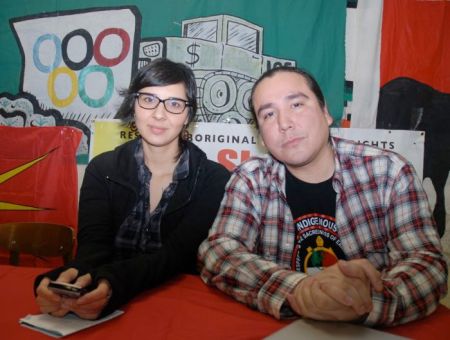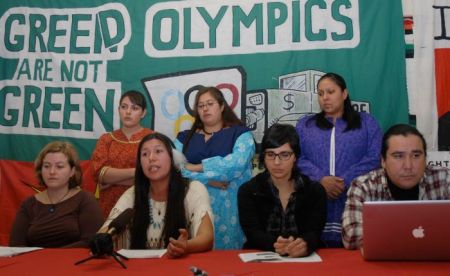STORY publié le Février 12, 2010 by Sakura Saunders
Greenest Games Ever? Frontline Voices Confront Olympic Greenwash

Eriel Deranger and Clayton Thomas Muller pose in front of a banner showcasing the environmental impacts of the games. (murray bush - flux photo)
Also posted by Sakura Saunders:
Aussi dans:
The Vancouver Olympics were billed by governments, sponsors and promotors as the "greenest games ever." But the resistance movement against the Games has decimated these claims, by bringing voices from people on the front lines of environmental destruction to the fore.
The 2010 Olympics has managed its "green" image by using shallow reporting and flawed accountability, says Clayton Thomas Muller of the Indigenous Environmental Network. He spoke out against the environmental impacts of the 2010 Games and its corporate sponsors along with representatives from impacted communities and major environmental justice organizations on the eve of the Olympic Opening Ceremonies.
“When we look at the assessment of the carbon footprint of the Games, the reality of it is that they only looked at very surface issues; they only looked at the flights,” Muller told a press conference on Olympic greenwashing. “They did not look at the forest loss, the tree loss, the impact on wetlands. They did not look at the construction CO2 imprint of all of the machinery that has been going 24/7 for the last year in preparation for the Games.”
“When we calculate all of that,” Muller concludes, “the games represent a much larger carbon and ecological imprint than what has been publicly stated by VANOC." This ecological imprint is most clearly seen in Whistler, the Olympic site 125 km north of Vancouver, according to Pina Belperio of Whistlerwatch.org and the Council of Canadians. This area has seen their last urban forest cut down, 70 per cent of their wetlands lost, and thousands of tress cut down in preparation for the games.
"While the focus of the games has been here in Vancouver, the bulk of the environmental destruction has unfortunately been happening in Whistler,” said Belperio. “Probably the biggest impact has been at the Callaghan Valley, which is known to most of the outside world as the Whistler Olympic Park. That area used to be primarily old growth and second growth forest and to date the estimates that we've seen are a loss of totalling 100,000 trees or more. The area has been opened to development and there is talk that the area will become a four-season report following the Games."
This sort of periphery development promoted by the 2010 Olympics is a major concern for Kanahus Pelki of the Secwepemc First Nation, who delivered a message from her people about the threats posed by the industrial boom sought by the BC government.
“Gordon Campbell has been quoted as saying that the spinoffs of the Olympics are something that BC can't even imagine,” said Pelki. “These investors and industries are creating major negative impacts on our territories. The territories that we continue to depend on for our traditional food and medicine harvesting. We depend on these glacier areas for our water."
Kanahus explained how the world's largest sockeye salmon run in the Adam's River is threatened by lead and zinc mining as part of this investment boom. All seasons resorts have also threatened sensitive ecosystems that her community relies on for fresh water.
"The Canadian Government is using the Olympics as a big advertisement that our lands are open for business," Kanahus charged. "But we want the world to know that our lands are not for sale here in BC. Our lands here are unsurrendered, unceded indigenous territories - we have never given up our land."
Eriel Deranger of the Fort Chipewan First Nation and a campaigner for the Rainforest Action Network, highlighted the role of Olympic Sponsors in destroying Native lands and disrespecting Indigenous rights. "I come here today as a tar sands impacted community member and as a tar sands campaigner. We see that the leading sponsors of the 2010 Winter Olympics are also complicit in the Alberta Tar Sands and the destruction and devastation of my people's territories."
"RBC (Royal Bank of Canada), the leading financier of Tar Sands and a top Olympic sponsor, continues to profit from the erosion of First Nations and human rights. They are saying that they will not implement a policy that respects the model of free prior and informed consent."
Foregoing Indigenous people's right to say 'no' to development that threatens their way of life, the Olympics sponsors and Tar Sands developers favor a system of carbon offsets to 'green' their activities. Muller explains the dangers this false solution presents:
"The reality is that you cannot offset or mitigate the horrific impacts on human and ecological health that are attached to the massive development that the 2010 Olympic Games represent and, even more insidious, you cannot offset or mitigate the massive destruction to human health and ecological harm that is represented by the dozens of corporate sponsors of the Olympics."
Olympic sponsors have invested millions of dollars on a green smokescreen to hide their destructive projects - but those who travelled here to speak about the real impacts of the Games proved that they can't hide the massive devastation of the Tar Sands and other projects any more than they can hide resistance to the Olympics.
The site for the Vancouver local of The Media Co-op has been archived and will no longer be updated. Please visit the main Media Co-op website to learn more about the organization.


Commentaires
Unobtainium
You're the intel I need right on the ground, right in the hostile's camp. I want you to learn the savages from the inside. I want you to gain their trust. I need to know how to force their cooperation or hammer them hard if they won't. Listen, this is how it's done. When people are sittin' on shit you want, you make them your enemy, then you justify the taking. They're fly-bitten savages who live in a tree. Alright, look around. I don't know about you but I see a lot of trees. They can move!